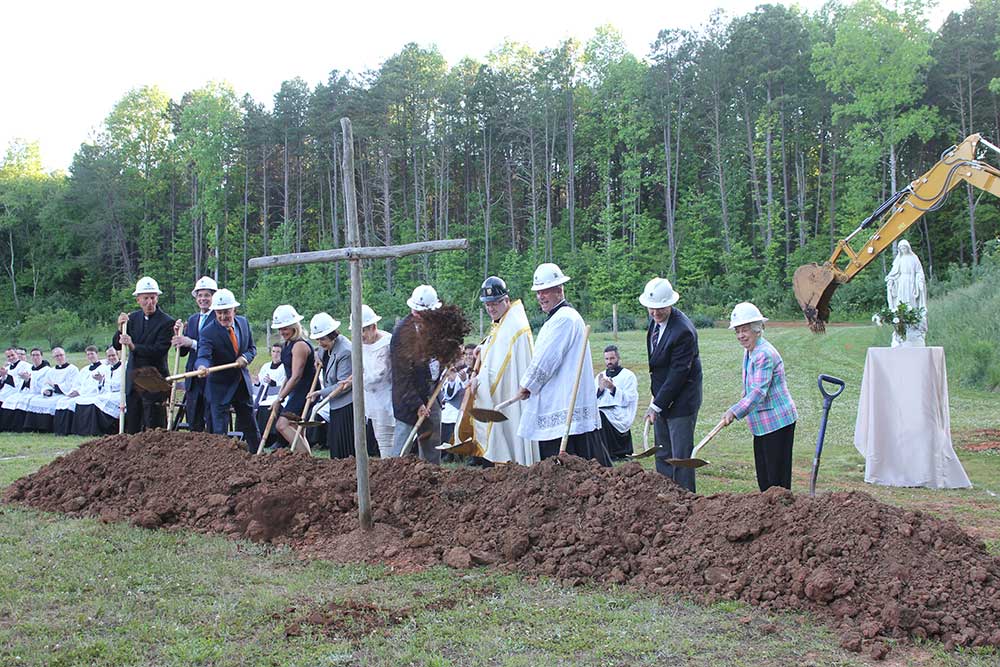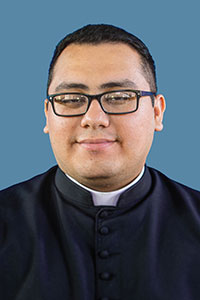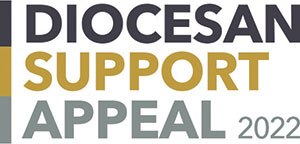A beacon of God’s love
 MOUNT HOLLY — Shovels tossed red dirt and prayers rose into the evening air May 1 as St. Joseph College Seminary leaders and supporters broke ground for a permanent chapel.
MOUNT HOLLY — Shovels tossed red dirt and prayers rose into the evening air May 1 as St. Joseph College Seminary leaders and supporters broke ground for a permanent chapel.
Hundreds of guests gathered on the exact site of the future chapel for the ceremony, held on the Solemnity of St. Joseph the Worker – a special day for the college seminary community. White lines on the ground around them marked the boundaries of the new structure, and a cluster of colorful balloons suspended in the air marked the height of the future chapel’s roof ridge: 61 feet.
The 9,026-square-foot building is the second major construction phase for St. Joseph College Seminary, which now houses 21 men who are discerning the priesthood for the Diocese of Charlotte while earning their degree at nearby Belmont Abbey College.
Father Matthew Kauth, rector, told the crowd that the seminary itself and the future chapel will serve as a beacon of God’s love in a world that often turns its face away from hope.
“This building is an artisan’s work – it is for you to come here, to gain strength and renewed hope,” Father Kauth said. “There are plenty in the world peddling doom and forecasting utter destruction…we are not buying what they are selling. We are happy indeed. We have a chance in life to do something beautiful for God.”
Prior to the groundbreaking, Father Kauth reflected on the benefits the new chapel will bring to the college seminary and to the growing Charlotte diocese.
“This is the culmination of 10 years of planning and dreaming and praying,” he said. “The chapel on any campus is, of course, the home of the Lord. This chapel will not only enhance the prayer lives of the seminarians, but also enable us to welcome more visitors to the seminary.”
“We currently have about 1,000 visitors a year and we can’t accommodate all those who want to visit with the current space,” he continued. “This will give Catholics from around the diocese a place to come for renewal, retreats and days of recollection. We want the seminary to be a place that welcomes people and renews their hope.”
The college seminary’s current, smaller chapel was originally designed as a lecture and banquet hall and will be used as such once the new chapel and meeting spaces are ready.
Besides the chapel that can seat up to 150 people, the project will include offices, a piazza and a welcoming hall designed to accommodate visitors from across the diocese. Fundraising to pay for the $22 million project was successful, yet Father Kauth noted that they expect the final price tag to be closer to $25 million to accommodate the growing program.
“Due to the generosity of the many donors to this project, we were able to add more spaces for the seminarians and faithful to come together,” he said. "To fund the whole project, we are making one more push, inviting broader involvement.”
Construction is expected to take at least 18 months. Architectural firm Michael G. Imber Architects of San Antonio, Texas, and Creech & Associates PLLC of Charlotte led the design effort with Father Kauth. Edifice LLC will oversee the construction work, which is not expected to interfere with the college seminary’s daily operations.
A procession kicked off Wednesday’s groundbreaking ceremony, followed by prayers and hymns led by the seminarians. Father Patrick Winslow, chancellor of the diocese, blessed with holy water the site and everyone gathered.
“With over a half a million Catholics in North Carolina, we have extraordinary growth – truly a blessing,” Father Winslow said.
He credited “the hand of God” for orchestrating all the people and all the efforts that came together to make the college seminary, and this latest milestone, a reality.
The college seminary will help train priests who will then go out to the parishes and minister to the diocese’s growing population, he said, and the new seminary chapel will be an integral part of the seminarians’ formation process.
Donors and their families, clergy and seminary staff beamed as they donned hard hats and took turns tossing shovelfuls of dirt to mark the groundbreaking.
A simple wooden cross stood next to the pile of dirt, made by the seminarians from trees on the property. Making a wooden cross to commemorate each milestone in the college seminary’s development – from the seminary’s groundbreaking in 2018 to its opening in 2020 – has become a tradition for the seminarians.
David and Shari Benore traveled from their home in Greenville, South Carolina, to take part in the event. The couple first met Father Jason Christian, the college seminary’s academic dean, when they were members of St. John the Baptist Parish in Tryon, where he then served as pastor. From him, they learned about the college seminary and have become devoted supporters. They both said it was “surreal” to see that support lead to them lifting shovels of dirt at the chapel’s beginning.
“We fell in love with the seminary from the beginning and knew we wanted to play a part,” David Benore said. “The chapel is going to be gorgeous.”
Supporter Joe Gigler of Charlotte recalled the day of the college seminary’s groundbreaking, which took place in the midst of Hurricane Florence’s fury passing through the area in 2018.
“It’s overwhelming to be here for this and to think where we have come since the seminary started,” Gigler said. “It’s wonderful to come out here and realize the commitment of everyone involved. The chapel is going to be an incredible space. I originally came from Pittsburgh, and in that area parishes are closing. Here we are building schools, churches and seminaries. I’ve been here for 40 years, and the growth has been amazing. It’s such an exciting time to be a Catholic in this part of North Carolina.”
— Christina Lee Knauss. Photos by Christina Lee Knauss and Patricia L. Guilfoyle
Read more and support the Chapel Campaign:
College seminary reaches initial $22M goal for chapel
$20M pledged for college seminary chapel, other features to welcome visitors
Seminarian Spotlight: Noé Sifuentes
From: Salisbury
Age: 23
Home parish: Sacred Heart Church, Salisbury
Status: Started Mount St. Mary’s Seminary, Cincinnati, in August 2022
Favorite Bible verse: “My soul proclaims the greatness of the Lord, my spirit rejoices in God my savior,” an excerpt from the Gospel of Luke and part of the Blessed Virgin Mary’s greeting to her cousin Elizabeth. Our Lady’s words here are known as the Magnificat, where she gives praise to God for all of His blessings.
Favorite saint: St. Dominic Guzman, founder of the Dominican Order. He has the same last name as my grandfather. I love that, and the fact that St. Dominic helped bring about devotion to the rosary.
Interests (outside of faith): Watching sports and attending theater and concert performances.
 CHARLOTTE — Noé Sifuentes grew up like many boys: playing video games, reading comic books and fishing – a “normal” childhood.
CHARLOTTE — Noé Sifuentes grew up like many boys: playing video games, reading comic books and fishing – a “normal” childhood.
In his teens he learned the value of hard work alongside his uncle, hauling wheelbarrows full of heavy debris from construction sites. During these years he also began serving as a sacristan at Sacred Heart Church in Salisbury, preparing the sacred vessels for Mass, where the seeds of his vocation were planted with the encouragement of his pastor.
Sifuentes credits attending Quo Vadis Days and the Bishops Youth Pilgrimage, annual youth retreats held at Belmont Abbey College, as well as the Diocesan Youth Conference, as events that opened up his heart to hear God’s call to study for the priesthood.
His “new normal” of life in service to the Church began when he entered St. Joseph College Seminary in Mount Holly in 2017.
He graduated in 2021 and served a pastoral year at St. Ann Church in Charlotte. Last August he and nine of his fellow seminarians began studies at Mount St. Mary’s Seminary in Cincinnati. They are among 49 men currently in some stage of formation to serve as priests in the Diocese of Charlotte.
Sifuentes reflects on his journey to the seminary in a conversation with the Catholic News Herald:
CNH: Can you tell us about your life before you entered seminary?
Sifuentes: I was born in Salisbury but grew up in Mexico until I was 8 years old. I am the oldest of four siblings. I went to Catholic school in Mexico, then attended public school when I moved back to the United States. My friends at school did not go to church, and they did not understand my interest in my faith in my teen years.
CNH: When did you hear the call to a vocation to the priesthood?
Sifuentes: There were two times. My mom says when I was in Mexico in Catholic school, I first learned about the Eucharist and went home that day and told her I wanted to be a priest. In eighth grade, Father John Putnam, my pastor at Sacred Heart Church, encouraged me to attend a confirmation retreat, even though I had made my confirmation in Mexico. On that retreat I was in Adoration praying before the Blessed Sacrament and interiorly I heard a voice say, “Follow Me.”
CNH: What helped you discern your possible vocation?
Sifuentes: Besides attending diocesan youth events, just being at Mass with my parents and siblings, getting close to the priests at my church, and being around seminarians helped me see the priesthood as a possible vocation. Our priests and seminarians are normal people. Their example and mentoring helped me see they are genuine people I can look up to.
CNH: What is a fun hobby or skill you have acquired since attending major seminary?
Sifuentes: Pizza making! At Mount St. Mary’s we have house jobs, or duties we fulfill at seminary. I was the “pizza master” and learned how to make pizza from scratch. If you had asked me five years ago if I would learn that skill in seminary, I would have said, “No way!” We have pizza nights some Wednesdays during the semester. I love to make a chicken and pesto pizza in the pizza oven we have there. One of our Charlotte seminarians makes the sauce and the dough, and we get to create our own pizzas. I really enjoy our pizza nights!
CNH: What advice do you have for a young man discerning a call to the priesthood?
Sifuentes: I’m borrowing my advice from the book “To Save a Thousand Souls: A Guide for Discerning a Vocation to Diocesan Priesthood,” by Father Brett Brannen.
He writes: “God cannot drive a parked car, so just go.” He means, just do something about it! If you think you have a vocation, talk to a priest, to your parents, to a friend – do something about it. That’s what helped me and continues to help me. It’s not a matter of waiting. Go and do something about it.
— SueAnn Howell
 Your DSA contributions at work
Your DSA contributions at work
The diocese’s Respect Life ministry is funded in part by the annual Diocesan Support Appeal. Learn more about the DSA and how to donate online at www.charlottediocese.org/dsa.


























 Your DSA contributions at work
Your DSA contributions at work